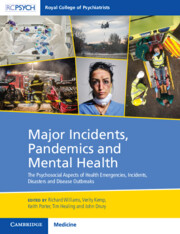 Major Incidents, Pandemics and Mental Health
Major Incidents, Pandemics and Mental Health Book contents
- Major Incidents, Pandemics and Mental Health
- Major Incidents, Pandemics and Mental Health
- Copyright page
- Dedication
- Contents
- Figures
- Tables
- Boxes
- Contributors
- Foreword by Dr Adrian James
- Foreword by Professor David Lockey
- Section 1 The Nature and Impacts of Twenty-First-Century Healthcare Emergencies
- Section 2 Clinical Aspects of Traumatic Injuries, Epidemics, and Pandemics
- Section 3 The Role of the Public in Emergencies: Survivors, Bystanders, and Volunteers
- Section 4 Responses to Meet the Mental Health Needs of People Affected by Emergencies, Major Incidents, and Pandemics
- Chapter 27 Principles for Intervening with the Wellbeing, Psychosocial, and Mental Health Needs of Mass Casualties
- Chapter 28 Facilitating Psychosocial Care for the Public After Major Incidents and During Pandemics
- Chapter 29 Mental Healthcare Required by People Who Are Affected by Major Incidents and Pandemics: Lessons from Research
- Chapter 30 Responding to the Needs of Children, Young People, and Their Families During the COVID-19 Pandemic
- Chapter 31 Social and Educational Impacts of Epidemics and Pandemics
- Chapter 32 Quarantine, Lockdown, and Isolation in the COVID-19 Pandemic
- Chapter 33 Reflections on Managing Infectious Diseases in Mental Health Units
- Chapter 34 Case Study 1: The Omagh Bomb, the Mental Health Response, and the Lessons Learned
- Chapter 35 Case Study 2: A Public Health Survey of People Exposed to the Paris Terror Attacks in November 2015 and Their Consequences
- Chapter 36 Case Study 3: Practical Approaches to Delivering Psychosocial and Mental Healthcare for the Public in the UK: Lessons Learned from a Major Incident in Manchester
- Section 5 Sustaining and Caring for Staff During Emergencies
- Section 6 Designing, Leading, and Managing Responses to Emergencies and Pandemics
- Section 7 Key Lessons for the Way Forward
- A Glossary of Selected Key Terms Used in This Book
- Index
- References
Chapter 30 - Responding to the Needs of Children, Young People, and Their Families During the COVID-19 Pandemic
from Section 4 - Responses to Meet the Mental Health Needs of People Affected by Emergencies, Major Incidents, and Pandemics
Published online by Cambridge University Press: 11 January 2024
- Major Incidents, Pandemics and Mental Health
- Major Incidents, Pandemics and Mental Health
- Copyright page
- Dedication
- Contents
- Figures
- Tables
- Boxes
- Contributors
- Foreword by Dr Adrian James
- Foreword by Professor David Lockey
- Section 1 The Nature and Impacts of Twenty-First-Century Healthcare Emergencies
- Section 2 Clinical Aspects of Traumatic Injuries, Epidemics, and Pandemics
- Section 3 The Role of the Public in Emergencies: Survivors, Bystanders, and Volunteers
- Section 4 Responses to Meet the Mental Health Needs of People Affected by Emergencies, Major Incidents, and Pandemics
- Chapter 27 Principles for Intervening with the Wellbeing, Psychosocial, and Mental Health Needs of Mass Casualties
- Chapter 28 Facilitating Psychosocial Care for the Public After Major Incidents and During Pandemics
- Chapter 29 Mental Healthcare Required by People Who Are Affected by Major Incidents and Pandemics: Lessons from Research
- Chapter 30 Responding to the Needs of Children, Young People, and Their Families During the COVID-19 Pandemic
- Chapter 31 Social and Educational Impacts of Epidemics and Pandemics
- Chapter 32 Quarantine, Lockdown, and Isolation in the COVID-19 Pandemic
- Chapter 33 Reflections on Managing Infectious Diseases in Mental Health Units
- Chapter 34 Case Study 1: The Omagh Bomb, the Mental Health Response, and the Lessons Learned
- Chapter 35 Case Study 2: A Public Health Survey of People Exposed to the Paris Terror Attacks in November 2015 and Their Consequences
- Chapter 36 Case Study 3: Practical Approaches to Delivering Psychosocial and Mental Healthcare for the Public in the UK: Lessons Learned from a Major Incident in Manchester
- Section 5 Sustaining and Caring for Staff During Emergencies
- Section 6 Designing, Leading, and Managing Responses to Emergencies and Pandemics
- Section 7 Key Lessons for the Way Forward
- A Glossary of Selected Key Terms Used in This Book
- Index
- References
Summary
Children are considered particularly vulnerable to disasters, but they are also resilient and respond to social support, which is central to disaster mental health services. This chapter reviews the current approach to services for children, presents a framework for response, addresses assessment, examines intervention approaches and the evidence base for intervention, and offers recommendations for future work. Population risk and context are important in guiding the mental health services that children require after disasters. The COVID-19 pandemic presented challenges that were not anticipated in the existing literature, suggesting that the type of event and event characteristics may be more salient than was previously realised. The predominant focus on post-traumatic stress outcomes in the extant literature has been criticised. Disaster preparedness and educational programmes have demonstrated benefit in fostering children’s participation in disaster management, and an emerging evidence base suggests benefit from a variety of intervention approaches.
Keywords
- Type
- Chapter
- Information
- Major Incidents, Pandemics and Mental HealthThe Psychosocial Aspects of Health Emergencies, Incidents, Disasters and Disease Outbreaks, pp. 223 - 230Publisher: Cambridge University PressPrint publication year: 2024
